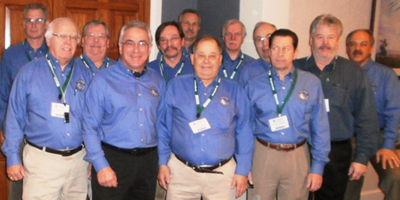
 ICC-ES NEWS ICC-ES NEWSClick here for more news on the ICC Evaluation Service. |
 IAS NEWS IAS NEWSClick here for more news on the International Accreditation Service. |
 ICC CHAPTERS & REGIONS NEWS ICC CHAPTERS & REGIONS NEWSClick here for more news on ICC Chapters and Regions. |
 |
Building Safety Month Is Right around the Corner!
|
| Back to top |
Feb. 20 Marks the 10th Anniversary of the Station Nightclub Fire The Rhode Island Station Nightclub fire claimed 100 lives. Like the Iroquois Theatre fire, the Triangle Shirtwaist fire, the Cocoanut Grove fire, Our Lady of the Angels fire and other horrendous blazes, the Nightclub fire has resulted in changes to the I-Codes, federal legislation and new ways to control crowds. |
| Back to top |
| ICC Supports Legislation to Provide a Tax Incentive for Voluntary Installation of Automatic Fire Sprinklers The Code Council, along with several associations, is urging the U.S. Congress to reintroduce and pass the Fire Sprinkler Incentive Act to make buildings safer. The call to action notes the recent Brazil tragedy and the Feb. 20, 10th anniversary of the Station nightclub fire. On January 26, the world watched a great tragedy unfold as 235 people were killed in a nightclub fire in Santa Maria, Brazil. The U.S. fire service extends its deepest sympathies to the victims' families as they cope with this tragic loss. The deaths of these individuals is made all the more tragic due to the preventable nature of their deaths, and further highlights the long overdue need for Congress to take substantive steps to encourage safer buildings and prevent future tragedies like this from occurring in the United States. The threat of fire spans all nations. The recent tragedy in Brazil immediately invokes memories of mass-fatality fires in the United States, such as the 2003 Station nightclub fire in West Warwick, R.I., which killed 100 occupants. As in Brazil, a simple fire sprinkler system could have drastically improved survivability rates for victims of the Station nightclub fire. As the nation mourned their loss in 2003, it watched as members of Congress introduced the Fire Sprinkler Incentive Act to assist property owners in retrofitting their properties with fire sprinklers. Ten years later, Congress has failed to pass the Fire Sprinkler Incentive Act. Since the Station nightclub fire and the original introduction of the Fire Sprinkler Incentive Act, fires in the United States have killed nearly 30,000 people, injured almost 100,000, and caused countless billions of dollars in damage. The proven technology of fire sprinklers has continued to demonstrate increased survivability rates in fires of 86 percent and reduced damage rates by 69 percent. Every day, far too many people are dying preventable deaths in buildings that are not sprinklered. The 10th anniversary of the Station nightclub fire, February 20, is fast approaching. Congress can honor the memory of the Station nightclub fire victims by reintroducing and passing the Fire Sprinkler Incentive Act and helping property owners make their buildings safer. There will be another dangerous fire in a crowded building, the only question is whether the people inside will have a chance to escape. Congress must lead the way for safer buildings in the United States by passing the Fire Sprinkler Incentive Act. |
| Back to top |
 |
Energy Code Ambassadors Program Slated for Delaware; Through a joint partnership of the International Code Council and the Building Code Assistance Project (BCAP), applications are being accepted for an Energy Code Ambassadors Program (ECAP) in the state of Delaware. The ECAP is designed to recognize code officials who are leaders in energy code knowledge and enforcement, so that they may help other code officials learn about this emerging area of code enforcement. Energy Code Ambassadors are go-to resources for assistance in the proper application of energy codes in all building types. |
| Back to top |
I-Codes Play Major Role in FEMA Building Codes Toolkit
|
| Back to top |
ICC Code Development Contributor Named to 2013 AIA College of Fellows  The 2013 Jury of Fellows from the American Institute of Architects (AIA) elevated 122 AIA members to its prestigious College of Fellows, an honor awarded to members who have made significant contributions to the profession. The 2013 Jury of Fellows from the American Institute of Architects (AIA) elevated 122 AIA members to its prestigious College of Fellows, an honor awarded to members who have made significant contributions to the profession.Among the Fellows is Architect and Code Consultant A. Vernon Woodworth, FAIA, LEED AP, C.B.O., an active participant in ICC code development and a major contributor to the development of the International Green Construction Code (IgCC). An extensively published and internationally recognized speaker and lecturer at professional symposiums and leading universities, Woodworth has more than 30 years of experience in architecture, code enforcement and code consulting in numerous project sectors. He is a licensed architect in the State of Massachusetts, works for AKF Engineers and is a member of the faculty at Boston Architectural College. He holds a Bachelor of Arts degree from New College in Urban Design and a Masters degree from the Harvard Divinity School. He is a Certified Building Official by the International Code Council, a LEED Accredited Professional by the U.S. Green Building Council, and has served as a member of the drafting committee of the IgCC, as well as on two subsequent code amendment hearing panels. Woodworth is the 2012 President of the Massachusetts Chapter of the American Institute of Architects (MA AIA) and currently serves with the Boston Society of Architects (BSA AIA). Out of a total AIA membership of over 83,000, there are just over 3,100 distinguished with the honor of fellowship and honorary fellowship. The elevation to fellowship is conferred on architects with at least 10 years of membership in the AIA. The Fellowship program was developed to elevate those architects who have made a significant contribution to architecture and society and who have achieved a standard of excellence in the profession. Election to fellowship not only recognizes the achievements of architects as individuals, but also their significant contribution to architecture and society on a national level. |
| Back to top |
 |
 |
 |
| For decades, the ICC Evaluation Service (ICC-ES) has been the industry leader in performing technical evaluations for code compliance, providing regulators and construction professionals with clear evidence that products comply with codes and standards. Having completed hundreds of evaluations of building products, components, methods and materials, ICC-ES has a proven track record of excellence in product evaluations. This record extends to reports regarding sustainability under standards such as the California Green Building Standards Code (CALGreen), the International Green Construction Code (IgCC) and other green rating systems. |
ICC Evaluation Service Issues Report on Innovative Simpson Strong-Tie®
|
| Back to top |
 |
Combined Lead Law/Performance Certifications for Plumbing Fittings Now Available through ICC-ES PMG: 2012 ASME Standard Removes Need to Conduct Separate Certifications The ICC Evaluation Service (ICC-ES) Plumbing, Mechanical and Fuel Gas (PMG) Listing Program will now list plumbing fittings (faucets, supply stops, etc.) to the requirements of ASME A112.18.1, NSF/ANSI 61, NSF/ANSI 372 and the lead plumbing laws all under the same certification report. |
| Back to top |
| In Other ICC-ES News |
| Learn More About the ICC-ES Building Product Listing Program |
| Earn CEUs—Attend the Free ICC-ES Webinar: Approving Innovative Building Products |
| Video: How to Read ICC-ES Evaluation Reports |
| Visit the ICC-ES Education Page |
| Back to top |
 |
 |
| The International Accreditation Service (IAS) provides objective evidence that an organization operates at the highest level of ethical, legal and technical standards. IAS is a nonprofit, public-benefit corporation that has been providing accreditation services since 1975. IAS accredits a wide range of companies and organizations, including governmental entities, commercial businesses and professional associations. IAS accreditation programs are based on recognized national and international standards that ensure domestic and/or global acceptance of its accreditations. |
IAS Schedules Accreditation Committee Meeting for June The International Accreditation Service (IAS) has scheduled the next Accreditation Committee Meeting for June 7 at the Sheraton Gateway Los Angeles. |
| Back to top |
 |
 |
 |
Niagara Frontier Building Officials Association — Annual Educational Conference The Niagara Frontier Building Officials Association (NFBOA) held its Annual Educational conference in Niagara Falls, N.Y. Pictured left are the NFBOA Chapter officers and the Education Committee. The Niagara Frontier Building Officials Association (NFBOA) held its Annual Educational conference in Niagara Falls, N.Y. Pictured left are the NFBOA Chapter officers and the Education Committee. |
| Back to top |
| North Central Texas Permit Tech Chapter ICC — Two-Day Training The North Central Texas Permit Tech Chapter ICC will host two one-day training seminars ("Preparation for the ICC Permit Technician Certification" and "Earn CEU's For Existing Certification") April 11–12 at the Hyatt Place in Garland, Texas. The seminars are open to all interested in attending. Thursday, April 11 | Welcome reception 7:30am–8:00am | Class 8:00am–5:00pm Preparation for the ICC Permit Technician Certification (6 CEUs) Certification Preparation Interactive Basic Plan Review Legal Aspects Review Basic Code Enforcement & Zoning Code Review Friday, April 12 | Class 8:00am–5:00pm Earn CEU's For Existing Certification (6 CEUs) Fire Suppression Systems 101 Outdoor Oasis Violence in the Workplace Permit Tech’s Tie It All Together Meals: Continental breakfast provided both mornings. Lunch is on your own with many restaurants within walking distance. Chapter meeting will be held during the lunch hour on Thursday. Registration Fees: Due by March 1. Late registration accepted based on availability. Registration form is available here. NTCPTCICC Members pay $35 per day, or $50 for both days. Nonmembers pay $45 per day, or $70 for both days (Nonmembers may become Chapter members by filling out the Chapter membership application and submit applicable dues with the training registration to receive the member registration fee). Location: Hyatt Place, 5101 North George Bush Highway (190), Garland, TX 75040. Hyatt Place offers a room rate of $88 per night. Rate is available April 9–14. For reservations, contact the hotel at 972-414-3500 and ask for the NCTPTC group rate. |
| Back to top |
Share Your Chapter News with Us Have a recent meeting you'd like to share with your fellow Chapters? Did you start a new program, elect new officers, have a successful training session or recognize a fellow Chapter member? Let's show our Chapter pride by sharing all the great things chapters do throughout the year in the name of public safety. Send your photos, captions and Chapter news items to chapters@iccsafe.org. We'll see that they are published in an upcoming edition of ICC eNews. |
 |